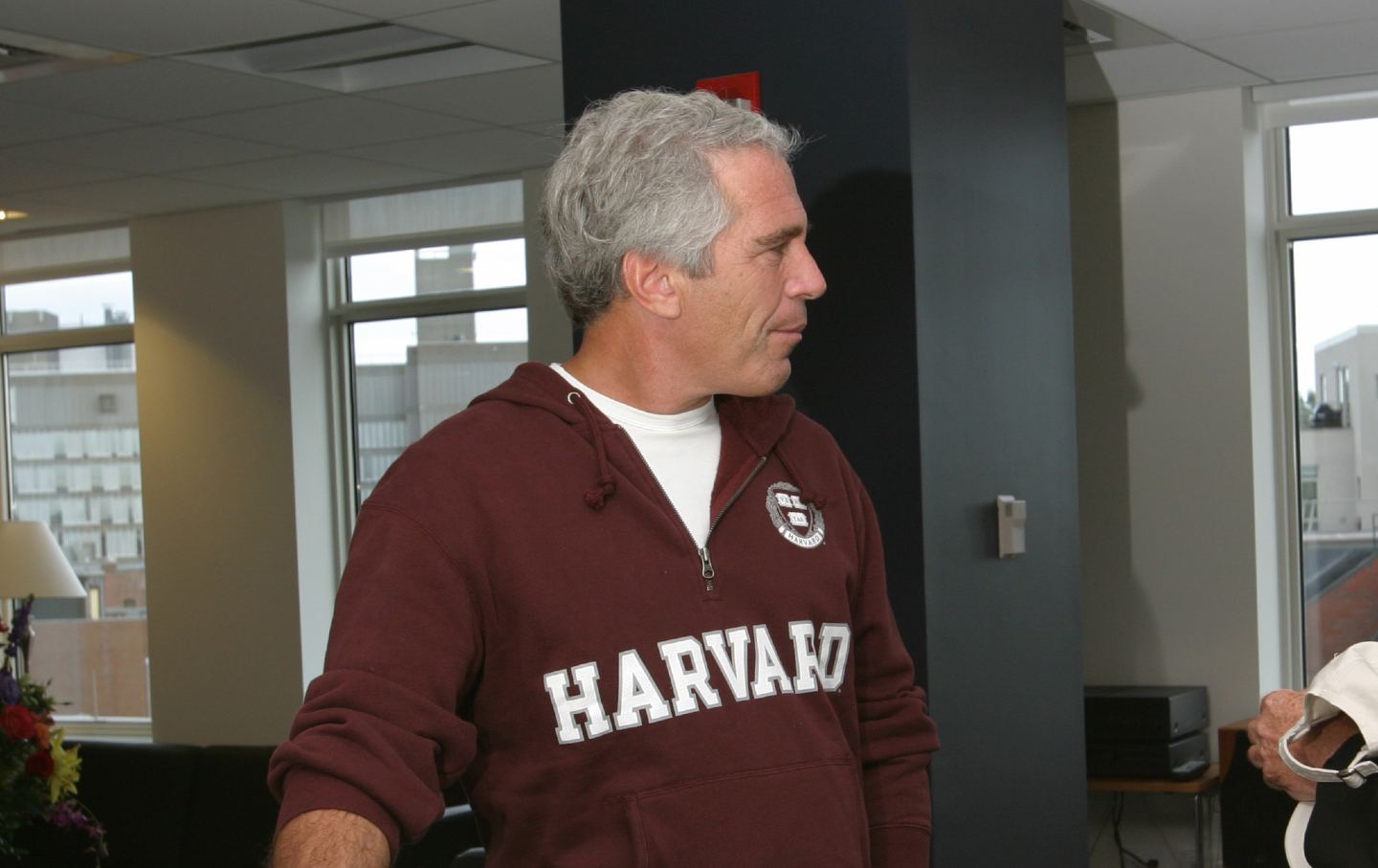Is Derek Penslar the Wrong Kind of Jew for Harvard?
He’s a distinguished scholar, director of Harvard’s Center for Jewish Studies, and former president of the American Academy for Jewish Research. But Bill Ackman doesn’t like him.

Derek J. Penslar is Harvard’s William Lee Frost Professor of Jewish History, director of the university’s Center for Jewish Studies and the two-time president of the American Academy for Jewish Research [AAJR]. In 2022, he was awarded the Lifetime Achievement Award by the Association for Israel Studies [AIS], and his most recent book, Zionism: An Emotional State, was a finalist in this year’s Jewish Book Council’s award for Modern Jewish Thought and Experience.
On paper, therefore, he was the ideal person for Harvard’s interim-president Alan Garber to tap to lead the school’s damage-control-inspired Task Force on Combating Antisemitism, whose creation followed the recent resignation of the school’s president, Claudine Gay, and the public relations debacle the university had experienced as a result. (Garber also appointed a panel on Islamophobia to be jointly headed by Wafaie Fawzi, the Richard Saltonstall Professor of Population Sciences, and Asim Ijaz Khwaja, Sumitomo-FASID Professor of International Finance and Development at the Kennedy School.)
That might be true if the battles over how to treat an upsurge in antisemitism (and perhaps even more so, islamophobia) in Ivy League and other elite American universities were actually about combating antisemitism (or islamophobia). They are not. They are about what faculty and students are allowed to say about Israel (and by extension, Palestine).
“Pro-Israel” funders, working in tandem with opponents of “diversity, equity and inclusion” [DEI] programs, fueled by conservative media organizations—all of which are exploited to their fullest political potential by attention-seeking Republican politicians and candidates—are currently conducting a relentless campaign to stigmatize virtually all criticism of Israel as ipso facto “antisemitism.” Together, they’ve created a truth-perverting political perpetual motion machine. The UCLA Jewish historian David Myers does not exaggerate when he warns that the attack on Penslar is not aimed at “just an eminent scholar, but more broadly, the American university as the site of expertise and critical thinking.”
Unlike the University of Pennsylvania’s recently resigned president, Liz Magill, Gay initially survived the attacks by Republican representatives, led by an increasingly unhinged Elise Stefanik (R-N.Y.), at a hearing in which three college presidents were consistently baited to respond to imaginary threats of “genocide” against Jews at the expense of actual policies supporting freedom of speech on campus. However, when it was revealed that she was technically guilty of plagiarism in a number of her published works, Gay, too, was gone. And while the violations were minor ones, there can be no doubt that Gay gave her enemies a sword.
Meanwhile The New Yorker recently reported that the Republican-dominated House Committee on Education and the Workforce is now investigating Harvard’s “response to antisemitism and its failure to protect Jewish students.” Jason T. Smith (R-Mo.), chair of the House Committee on Ways and Means, wrote to the current presidents of Harvard, MIT, the University of Pennsylvania, and Cornell noting “the disappointing and lackluster responses by your respective universities to Hamas’ attacks and your subsequent failure to adequately protect Jewish students from discrimination and harassment,” and contrasting this with each school’s alleged warning to students in a Title IX training that failing to use their classmates’ preferred pronouns could constitute harassment. With a threat of billions of lost funding looming in the background, Harvard is still playing defense.
The leadoff hitter in the campaign to smear Penslar was Ira Stoll, a decades-long veteran of a number of well-funded right-wing Jewish agitprop websites dedicated to personal attacks on critics of Israel. His lengthy list of complaints includes the fact that Penslar believes—with most scholars of the topic—that the concept of “settler colonialism” is “very important for analytical purposes” in looking at Israel, though he has not specifically endorsed its application. Stoll also does not like the fact that Penslar shares the commonly held, evidence-supported claim that the number of Palestinians expelled by Israel during the War of Independence (or Nakba) is approximately 750,000.
Stoll also complains that Penslar’s preferred definition of antisemitism is not the Israel-centric International Holocaust Remembrance Alliance version he and other right-wingers promote (and which has been denounced by its principal author) but instead prefers the more carefully constructed Jerusalem Declaration alternative created by scholars in the field. And he is upset that Penslar believes some people might be exaggerating the degree of antisemitism that has currently captured the Harvard campus. It would be tedious and pointless to adjudicate all of Stoll’s attacks—except to note that he presented little or no evidence to support them, and not one has been endorsed by a significant member in the field of Jewish or Israel studies. Instead, 300 such scholars have signed a petition condemning the campaign, joined by institutional letters of strong support for Penslar from the AAJR and the AIS.
Though devoid of academic support, opposition to Penslar has instead been endorsed by William Ackman, the billionaire Harvard alumnus who led the successful campaign against Gay. Ackman retweeted Stoll and added that with Penslar’s appointment to the task force Harvard had taken a step down “the path of darkness.”
Borrowing talking points from these and other critics, deeply misleading articles on Penslar appeared in right-wing media outlets including the New York Post, The Wall Street Journal (both owned by Rupert Murdoch’s News Corp), National Review, The Daily Caller, and Washington Free Beacon, Jewish Insider and Tablet, among many others. Elise Stefanik went all in on her audition to be Trump’s running mate with a rant about what she called Penslar’s “despicable antisemitic views and statements.”
Predictably, institutional support for the smear campaign also came from Anti-Defamation League head Jonathan Greenblatt, who accused Penslar of being someone who “libels the Jewish state.” The ADL chief, who has been instrumental in whitewashing the virulent antisemitism of Elon Musk—and once praised Henry Ford, either unaware of or unconcerned with Ford’s own history of Jew-hatred—also picked up on a quote from Penslar’s recent book in which he wrote that “veins of hatred run through Jewish civilization.” Greenblatt condemned this as “absolutely inexcusable,” failing to notice that the reference in question refers, in the very next sentence, to “the Hebrew Bible,” in which “God commands the Israelites to annihilate the Amelekites” and, in the worlds of the Book of Deuteronomy (25:17-19), “erase their memory from under Heaven,” because “[t]hey had no fear of God.”
That is just one instance of many in the Torah—which Greenblatt may not be familiar with, but trust me, the book is full of them. (Check out Numbers 25 to learn how these same Israelites apparently treated the Moabites for the crime of allowing their women to seduce them.) Greenblatt is also upset by Penslar’s observation, “In medieval and early modern Europe, where Jews lived as a small and often persecuted minority, Jewish culture was steeped in fantasies (and occasionally, acts) of vengeance against Christians.” Again, nothing about this sentence is even remarkable in the context of actual historical scholarship—nor, given the treatment Jews received into those times and places, should it be at all surprising.
Popular
“swipe left below to view more authors”Swipe →I’ve gotten to know Penslar a bit recently from panels we’ve both served on and the ensuing dinners, and have come to admire both his work and his (enviable, in my case anyway) calm, scholarly demeanor. Had he been thinking of himself as a potential politician, I think it’s fair to say, Penslar might have hesitated before signing what has been called the “Elephant in the Room” letter, well-before October 7, attacking “American Jewish billionaire funders [who] help support the Israeli far right,” and endorsing the use of the word “apartheid” to apply to Israel’s treatment of the Palestinians. Penslar told me that he tried to get the wording softened, but, when he failed, he signed anyway, because he was angry at the behavior of Israel’s far-right government. It should be noted that the same letter was also signed by nearly 3,000 Israeli and North American Jewish scholars—and all of it was evidence-based.
If one person had the standing to inject some common sense into this debate, it might have been former Harvard president Lawrence Summers. The youngest person ever tenured at the school, Summers is both an influential academic and a canny politician. In the case of Penslar, he allowed the latter aspect of his character to overwhelm the former, tweeting that while he had “no doubt that Prof Penslar is a profound scholar of Zionism and a person of good will without a trace of personal anti-Semitism who cares deeply about Harvard,” his views should nonetheless have disqualified him to Harvard’s task force.
Fortunately, President Garber has rejected Summers’s unwanted counsel and, according to a university spokesperson, insists that he “believes that the effort to combat antisemitism at Harvard will benefit from a variety of perspectives and experiences, including those offered by [the] co-chairs.” The scholar, having considered stepping aside, has made it clear he will not bow down to the mob. A drop in the ocean or a turning of the tide? Future historians will have to decide. The rest of us can only hope.
More from The Nation

The “Harvard Law Review” Refused to Run This Piece About Genocide in Gaza The “Harvard Law Review” Refused to Run This Piece About Genocide in Gaza
The piece was nearing publication when the journal decided against publishing it. You can read the article here.

“One of the Worst Weeks at Harvard I’ve Ever Experienced”: The Targeting of Campus Activists “One of the Worst Weeks at Harvard I’ve Ever Experienced”: The Targeting of Campus Activists
How a letter from the Harvard Palestine Solidarity Committee became an international news story.

Jeffrey Epstein, Harvard Man Jeffrey Epstein, Harvard Man
Why a horrific criminal found elite universities so congenial.

Harvard Reverses Course After a “Nation” Exposé Harvard Reverses Course After a “Nation” Exposé
The Kennedy School has decided to extend an invitation to Ken Roth, the former head of Human Rights Watch, after a Nation cover story revealed that his fellowship was initially vet...

Why the Godfather of Human Rights Is Not Welcome at Harvard Why the Godfather of Human Rights Is Not Welcome at Harvard
Kenneth Roth, who ran Human Rights Watch for 29 years, was denied a fellowship at the Kennedy School. The reason? Israel.


